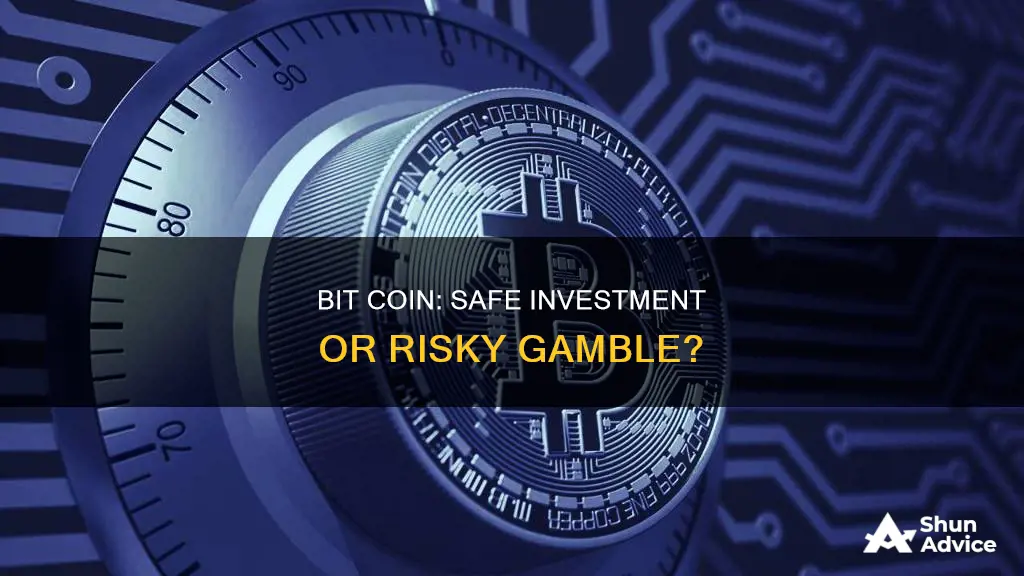
Bitcoin is a highly controversial investment option. It is a risky investment with more volatility than traditional investments like stocks, bonds, and funds. It is also subject to scams and security threats. Bitcoin's value can be extremely volatile, and it has no inherent value. It is also not regulated, and it's uninsured, meaning that if the exchange that holds your crypto investments fails, you could lose your entire investment. On the other hand, Bitcoin has the potential for high returns and is decentralised. It is also considered a non-correlated asset, similar to gold, meaning it may not follow the trends of other assets.
| Characteristics | Values |
|---|---|
| Volatility | Bitcoin is extremely volatile, with prices fluctuating massively |
| Security | Bitcoin is prone to scams and theft |
| Legality | Bitcoin is legal in many places, but illegal in some countries, including China |
| Regulation | Bitcoin is largely unregulated |
| Tax | There are tax obligations associated with Bitcoin |
| Accessibility | Bitcoin can be stored in hot or cold wallets |
What You'll Learn

Bitcoin's extreme volatility
Bitcoin is a particularly risky investment with more volatility than traditional investments in stocks, bonds, and funds. Its price can be extremely volatile, and it has a history of dramatic rises and falls. For example, in 2010, Bitcoin returned an astronomical 30,203%, but in three separate years, it has dropped by more than 60%, including a massive 73% loss in 2018.
The cryptocurrency market is prone to roller-coaster fluctuations, and unlike traditional financial exchanges, crypto markets don't have circuit breakers to pause trading when prices move too quickly. This means that Bitcoin's price could move up or down much faster than traditional investments.
The relative newness of the cryptocurrency market also contributes to its volatility. As it is still relatively new, investors may not know exactly what to make of it yet. Because crypto doesn't have the same historical proof points of other asset classes, it may be more prone to huge price swings that come with shifting investor sentiment.
Additionally, the regulatory environment surrounding cryptocurrency is still evolving, and the lack of consistent regulation makes crypto markets more vulnerable to instability. For example, in 2021, China's crackdown on crypto-related activities coincided with a drop in Bitcoin's price. With many world governments still weighing how to react to crypto's rise, there are a lot of factors that may continue to contribute to Bitcoin's volatility moving forward.
To mitigate the risk of investing in Bitcoin, it is generally recommended to only invest what you can afford to lose and to maintain a diversified portfolio that includes several different types of investments to reduce overall risk exposure.
Coinbase Crypto Investment: Best Bets for Your Portfolio
You may want to see also

The risk of scams
Scams are a significant risk for anyone investing in Bitcoin. Scammers use a variety of methods to defraud unsuspecting investors, including fake investment platforms, phony investment managers, celebrity impersonations, and financial grooming/romance scams.
Fake Investment Platforms
Criminals lure investors into setting up accounts on an online investment platform with the promise of fabulous returns. What the investors don't know is that the platform is actually a Ponzi scheme, in which they're paid returns out of money put in by other investors.
Phony Investment Managers
You may be contacted out of the blue by someone claiming to be an investment manager, who will promise to grow your money but only if you buy cryptocurrency. They'll guide you to an investment website that looks real but is a clever fake. When you try to withdraw some of your earnings, you can't, or you'll be told you first need to pay high fees.
Celebrity Impersonations
Scammers impersonate celebrities, contacting fans through social media to offer a chance to make a killing on a cryptocurrency investment. They'll ask you to send cryptocurrency to them by clicking on a link or using a QR code that supposedly belongs to the celebrity. In reality, your cryptocurrency goes straight to the scammer, and you're not going to see it again.
Financial Grooming/Romance Scams
Criminals adopt a fake online profile to gain a victim's affection and trust and then use the illusion of a romantic or close relationship to manipulate and/or steal from the victim. Criminals running these scams may even kidnap people to work in call centers, forcing them to entice investors with fake promises of romance.
The Crypto Investment Conundrum: Which Coin to Choose?
You may want to see also

The lack of consumer protection
Bitcoin and other cryptocurrencies are subject to little to no consumer protection. This is due to the fact that they are not backed by any government or central bank, and are not insured by the Federal Deposit Insurance Corporation or the National Credit Union Share Insurance Fund. As a result, if a cryptocurrency company fails, the government will not cover any losses.
Additionally, many cryptocurrency companies do not identify their owners, provide phone numbers and addresses, or specify their location. This makes it difficult for consumers to know how to contact the company or understand their contractual rights. If something goes wrong, these companies may not offer the kind of help that consumers would typically expect from a bank or credit card provider. In fact, some virtual currency companies even disclaim responsibility for consumer losses if funds are lost or stolen.
The volatile nature of the cryptocurrency market also poses a risk to consumers. The exchange rate of Bitcoin to US dollars, for example, has been known to fluctuate by up to 80% in a single day. Consumers who buy virtual currencies need to be prepared for this kind of volatility and consider the potential for mark-ups and other fees when using an exchange or digital wallet provider.
In summary, the lack of consumer protection in the world of Bitcoin and other cryptocurrencies leaves investors vulnerable to fraud, scams, cyber-attacks, and significant financial losses.
A Guide to Investing in Verge Coin: India's Prospects
You may want to see also

The irreversible nature of transactions
Bitcoin transactions are irreversible, meaning that once a transaction is made, it is impossible to reverse it. This is a fundamental innovation of Bitcoin, as it removes the need for a bank or other third party to arbitrate transactions. This allows for increased transaction speed, secure payments, and fee-free transactions.
Bitcoin transactions are recorded on a ledger, known as the blockchain, which is maintained by the Bitcoin network. A bitcoin is essentially a spot on this ledger, and "ownership" of a bitcoin means you own access to that spot. Once a transaction is sent to the network, ownership of that spot is transferred to the recipient, who will then be the only person who can access it.
The irreversibility of Bitcoin transactions is ensured by the decentralised nature of the Bitcoin system. Bitcoin uses a decentralised system, where consensus among nodes following the same protocol and proof of work is substituted for a central authority. This means that Bitcoin has special properties not shared by centralised systems. For example, if you keep the private key of a bitcoin secret and the transaction has enough confirmations, then the bitcoin cannot be taken from you, no matter the reason or excuse. Possession of bitcoin is enforced by cryptography and game theory, not business rules and policy.
The irreversibility of transactions also avoids many fraudulent practices, such as transaction reversal fraud or chargeback fraud, which costs companies about $4 trillion. Bitcoin transactions are also more secure than traditional payment methods, as they do not require personal information such as billing address or name.
However, the irreversibility of Bitcoin transactions can also be a disadvantage. For example, if you accidentally send funds to the wrong address, there is no way to reverse the transaction. In this case, you would need to contact the recipient and request a new transaction to send the funds back to your account.
The Ultimate Guide to Investing in Dogecoin via Cash App
You may want to see also

The possibility of losing wallet access
Bitcoin is a highly volatile and risky investment. One of the biggest risks is losing access to your Bitcoin wallet. Here are some ways this could happen:
Losing Your Private Keys
Private keys are unique strings of characters that allow you to access and manage your digital assets. If you lose these keys, you'll be unable to access your wallet, similar to losing the combination to a safe. This can happen through simple forgetfulness, hardware failure, or data corruption. The decentralised nature of cryptocurrencies means there is no central authority to help with key recovery, so safe storage practices are essential.
Theft
Hackers and cybercriminals employ various tactics to gain unauthorised access to wallets, transferring assets to their control.
Frozen by Centralised Wallet Providers
If you use a custodial wallet from a centralised exchange, your account could be frozen if you're involved in suspicious activity. However, this protective measure can also lock legitimate owners out of their wallets if their credentials are compromised or if they are mistakenly flagged.
Death of the Wallet Owner
Without proper estate planning that includes the transfer of private key information, a deceased person's Bitcoin wallet can become permanently inaccessible.
Sending Bitcoin to the Wrong Address
Due to the irreversible nature of blockchain transactions, sending Bitcoins to the wrong address can result in the loss of assets.
Dormant Wallets
A wallet becomes dormant when it hasn't engaged in any transactions for an extended period. This can be due to the owner losing interest or forgetting about the wallet. While not technically lost, dormant wallets represent a significant amount of Bitcoin removed from active circulation, contributing to the currency's scarcity.
To prevent losing access to your Bitcoin wallet, it's crucial to adopt robust self-custody practices and have a reliable backup and recovery plan. You can use a hardware wallet to keep your keys offline and away from threats on your internet-connected device. Additionally, you should store your seed phrase (or secret recovery phrase) in a safe place that's resistant to fire and water damage.
The Ultimate Guide to Cryptocurrency Coin Price Investing
You may want to see also







